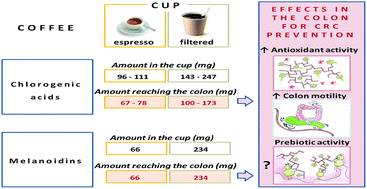Coffee, colon function and colorectal cancer
Abstract
For several years the physiological effects of coffee have been focused on its caffeine content, disregarding the hundreds of bioactive coffee components, such as polyphenols, melanoidins, carbohydrates, diterpenes, etc. These compounds may exert their protection against colorectal cancer (CRC), the third most common cancer worldwide. However, the amount and type of compounds ingested with the beverage may be highly different depending on the variety of coffee used, the roasting degree, the type of brewing method as well as the serving size. In this frame, this paper reviews the mechanisms by which coffee may influence the risk of CRC development focusing on espresso and filtered coffee, as well as on the components that totally or partially reach the colon i.e. polyphenols and dietary fiber, including melanoidins. In particular the effects of coffee on some colon conditions whose deregulation may lead to cancer, namely microbiota composition and lumen reducing environment, were considered. Taken together the discussed studies indicated that, due to their in vivo metabolism and composition, both coffee chlorogenic acids and dietary fiber, including melanoidins, may reduce CRC risk, increasing colon motility and antioxidant status. Further studies should finally assess whether the coffee benefits for colon are driven through a prebiotic effect.

- This article is part of the themed collection: First International Congress on Cocoa, Coffee and Tea

 Please wait while we load your content...
Please wait while we load your content...